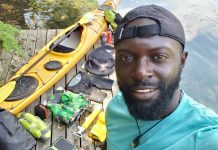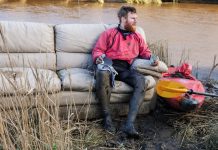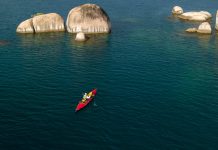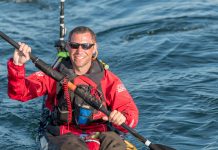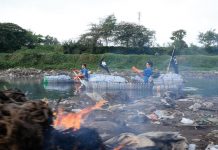When Australian adventurer Mark Kalch completed an epic, 153-day source-to-sea descent of the Amazon River in 2008, he had no idea the expedition would become the springboard for 7 Rivers, 7 Continents—a bid to paddle the longest rivers on each continent. Now based in Buenos Aires, Argentina, with his girlfriend and three young children, Kalch has turned adventure into a full-time vocation.
In 2012, he paddled the Missouri-Mississippi Rivers, and in 2014 he made a first solo descent of Russia’s 2,300-mile Volga River. Off the river, he stays busy researching and planning the next leg, and sharing trip stories and images.
Adventure Kayak: Tell me a bit about what you’re up to right now?
Mark Kalch: Right now (and for the last two years) I have been living in Buenos Aires, Argentina. We (myself, my girlfriend and our three children under the age of 5) find ourselves here by virtue of my partner’s job as a diplomat. It is a real mega-city and not exactly helpful in connecting easily with the outdoors.
However, where there is a will there is a way and I paddle at least a few times a week on the enormous Rio de la Plata. Of course the country as a whole offers world-class paddling and outdoor experiences. We spent a month camping and paddling in Patagonia earlier this year which was fantastic. To be able to share this experience with the children was beautiful.
I am kept busy here by trying to constantly hone my paddling skills, be that kayaking or more recently SUP, attempting to write my first book about my Volga River descent, staying in touch with sponsors, developing my own paddling apparel brand, Paddlers First, and planning for my next big river descent as part of my 7 Rivers, 7 Continents project.
AK: Where did the idea for 7 Rivers, 7 Continents come from? Why paddling expeditions?
MK: It was an idea which kind of just grew out of a desire to continue undertaking long and sometimes difficult journeys after the completion of our source to sea descent of the Amazon River in 2008. In 2010, I walked alone across the entire Islamic Republic of Iran from the Caspian Sea in the north to the Persian Gulf in the south. A really amazing journey in a beautiful country. I was somewhat stumped in deciding what to do next.
After tossing around ideas for climbing mountains in Afghanistan and Pakistan, my girlfriend suggested a longer term project whose successive expeditions were linked. Why not the longest river on each continent, she thought? I was immediately hooked. With the Amazon River, South America’s longest river, already completed it was a great springboard from which to launch. Now the project is such a huge part of my life, I am not sure how there could have been any other option.
Why paddling expeditions? The greatest civilizations in history and indeed modern times have sprung and flourished alongside them. Cities, towns, villages and communities exist where they do in large part down to rivers. They provided a means of transport, trade, power, food and water. Even now the impact they have on our planet is immense. To paddle down huge rivers like the Amazon, the Volga, the Missouri and the Yangtze is an opportunity to experience and understand this impact first-hand. Oh, and mostly I just really like paddling!
AK: What were the most surprising aspects of your Volga trip? How did your preconceptions of Russia and its people compare with the reality?
MK: I think the number one most surprising thing was the absolute beauty of the river. I had expected to come across a much higher level of pollution and degradation of the river. At least, on a visual scale, it appeared for the most part pristine. Unfortunately, environmental studies have shown that the strains on the river due to agricultural, household and industrial pollutants are massive and ever increasing.
I grew up in Australia throughout the end of the Cold War. As in most Western countries, I was fed a media biased view of a menacing and cold Soviet Union, grey industrial cities and a population to match. Despite being fully conscious of this narrow view and completing extensive research, it is still hard to know what to expect. I really had no clear idea what I would encounter.
Fortunately, the Russia I experienced was in its beauty and hospitality far greater than anything I could have imagined. In all my journeys and travel I do not think I have been cared for and welcomed in such a way. It really became quite surreal as each day afforded me ever more amazing paddling and the opportunity to meet such friendly people of the Volga. Whenever I talk about my Volga descent I get the feeling that people must think I am exaggerating. Happily I am not.
AK: Tell me about what’s going on in this photo. Why are you grinning so widely!?
MK: Ha, ha! What a photo! It really does kind of sum up my Volga descent. I had spent the last five or six days really battling the weather on the river. Constant rain, massive headwinds, powerful storms and this huge waterway to paddle. The day previous I had been forced to make camp early just due to the incessant wind. I am not one to capitulate easily to the elements and rather enjoy the challenge but the sheer effort had really become counter-productive. I found a good camp and rested up.
The following morning, in order to get an early start I skipped my usual power breakfast of oats, raisins and strong coffee, instead grabbed some extra chocolate bars for sustenance. Rookie error. A few hours into the day I bonked (massive fatigue set in). I was angry at myself for the mistake but had not much option but to paddle on. I had hoped to make it past the city of Ulyanovsk that day, but realized I would have to settle for being happy to actually reach it.
In late afternoon, I approached its outskirts and began scouting for a place to camp. With few options presenting themselves, a night beside an old factory looked promising enough. As I floated closer, between the trees a man appeared. He waved and shouted a greeting, motioning for me to come ashore. Utilizing my faltering Russian language skills, I understood that Dmitri wished for me to take out right there. I did so gladly. Within a few minutes Dmitri had introduced himself, his brother and various friends. Dmitri and his brother, who spoke very good English, were working on their dacha situated on the banks of the Volga River. They were renovating some of the buildings within the compound, as well as cultivating a burgeoning and impressive organic vegetable garden.
It was quickly established that I would be staying in their dacha. But first Dmitri insisted on taking me on a driving tour of Ulyanovsk, most famous as the birthplace of Lenin. Upon our return, Dmitri informed me that evening we would be having dinner at the dacha with a group of their friends. Before eating, however, I needed to be introduced to the ubiquitous Russian banya, or sauna.
My new friends prepared the stone-walled and rather authentic looking banya by stoking a fire to unbelievably high temperatures. Then it was time to strip naked and see how long we could bear the intense heat. On Dmitri’s order, we filed naked down to the Volga and dived into its cold water. In winter, they must cut a hole in the fully frozen river to attempt the same. We repeated this once more before Dmitri asked his brother to translate something for me: “Mark, now there will be some pain.” What the…? The boys produced branches from a birch tree and proceeded to whip the living daylights out of me in the banya—front, back and sides. He was right, there was some bloody pain! Once more into the Volga and done.
A huge dinner, friends, laughing, beer and vodka followed. We talked endlessly about my journey, Russia, the West, everything. It was an experience that I continue to treasure. In the space of a few minutes I had gone from the prospect of camping beside a dismal old factory to one of the best nights on my entire journey. Hence the big smile!
AK: Why do you do these trips? What keeps you motivated to leave family and friends behind for months at a stretch?
MK: It is always difficult to pin down exactly why I do these trips. I would say that, from a personal perspective, I really enjoy the simplicity of life on a big river. After that initial period of transition from the “comfortable” life of the real world, the attraction of having to focus on only a very small number of needs is wonderful. Stay dry, stay watered, stay fed, paddle and explore. I like that.
I also very much enjoy sharing images and stories from my trips. I have made, since the Amazon, effort to deflect some of the focus of my journeys from me, the “hero,” to the river, its people and surrounds. The dashing adventurer narrative is just one tiny and often very much overused part of these expeditions.
I repeat over and over in interviews, articles and updates that by far the most difficult thing for me in all of my journeys is leaving my family. It really is. I enjoy battling and sometimes working with the river to follow its course. That is the easy part. It is more or less a holiday for me. But not seeing the kids is tough. So why keep leaving them? My passion for experiencing this planet was instilled in me by my father who was awed by the Earth’s wonders, natural and man-made. I hope that the kids, seeing me explore such amazing places and bringing back stories, will also share this wonderment.
AK: Why make adventure your full-time job?
MK: I think primarily for me the advantage is the amount of time I can spend researching, planning and undertaking my journeys. I spend a lot of time learning about not just the river I am to paddle, but the regions or countries through which it will pass, and also the people and cultures I will be fortunate to meet and experience.
It also means that I can develop good relationships with my sponsors who see me as a full-time paddler that can represent their brand in a credible light. Their support over the years has allowed me to keep the costs for my descents down as much as possible.
Perhaps less wisely from an exposure perspective, I attach little fanfare or media chasing to my 7 Rivers project. I paddle my rivers, share interesting stories and images, then if people get in touch with me I am more than happy to oblige. To me, a meaningful interview with Adventure Kayak is worth 100 times in value a time filler TV slot or a few inches in a national newspaper. This attitude does hurt me financially, but I feel more comfortable with it. I have too many paddling friends around the world who are doing amazing journeys and don’t feel compelled to let everyone know how awesome they are.
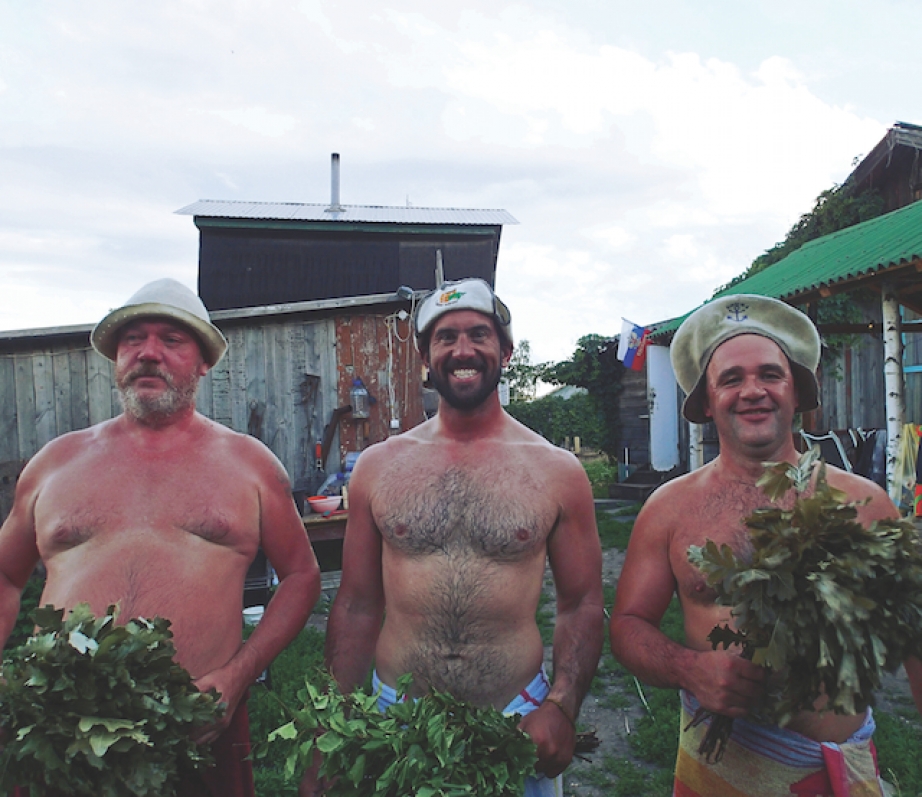
AK: You mentioned in an interview with Alastair Humphreys that you could have—maybe should have—paddled the second or seventh longest rivers, and the experience would have been quite similar. Do the stresses of this project becoming a race detract from your enjoyment when you’re out there?
MK: The stress of a potential race does not detract from my enjoyment when I am on-river. I remain blissfully and purposefully unaware of the “real world” back home when I am paddling. However, yes, I do not enjoy the prospect of a race. I have nothing against fast descents; for some people that is their thing, they are paddling machines. I am often in awe of them. I feel like a bit of a monster paddler myself and love going hard out, but it is not my interest.
It was during our Amazon River descent in 2007, which began as a purely river focused and adrenalin-packed adventure that I realized there can be so much more to these journeys than just paddling. Having to complete these rivers from source to sea within the time dictated to me by my visa length pains me no end. I want my descents to take longer. I want to be able to stay with new friends, I want to be able to explore farther beyond the river bank, get lost walking through towns and cities, understand my surroundings and how these mighty rivers have impacted it all.
Can you imagine blasting down the Yangtze River, or any big river, to the ocean and all but ignoring the thousands of years of history and culture to be found?
AK: What’s next? Which river will you tackle in 2016?
MK: It really is dependent on so many things. Family, finance, preparation, and water levels or season are most pertinent. I am really excited by the Yangtze River in China. It is a touch under 4,000 miles in length. The Upper Yangtze has some really very difficult sections, to say the least. The lower is stifled by dams and becomes huge in width and volume. The impact that this river has had on the development of China is overwhelming. I really look forward to paddling it.
Another option, at just under 3,000 miles, is the Murray-Darling River in Australia. I have probably been a little dismissive of my own country’s longest river, but recently I have taken a step back and really appreciated the waterway a lot more. It passes through some of Australia’s most spectacular wilderness areas and takes a paddler past towns and regions made famous by European exploration of the continent. Throw in some of the world’s most deadly snakes and spiders and it now sounds pretty exciting to me.
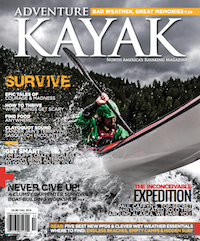
Subscribe to Paddling Magazine and get 25 years of digital magazine archives including our legacy titles: Rapid, Adventure Kayak and Canoeroots.



